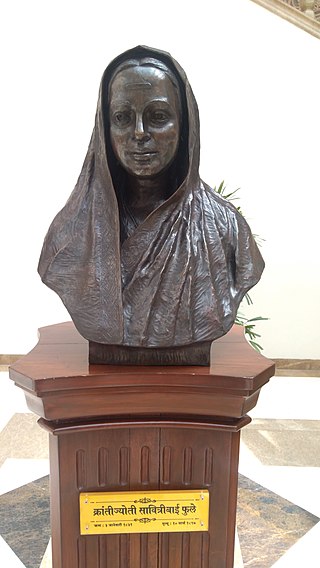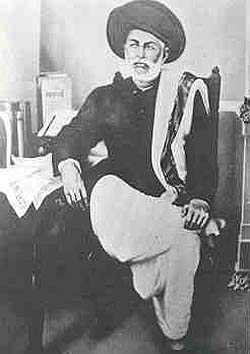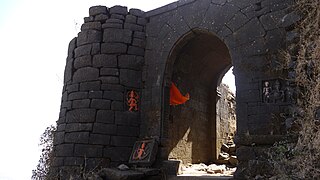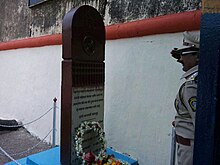
Jyotirao Govindrao Phule was an Indian social activist, businessman, anti-caste social reformer and writer from Maharashtra. His work extended to many fields, including eradication of untouchability and the caste system and for his efforts in educating women and oppressed caste people. He and his wife, Savitribai Phule, were pioneers of women's education in India. Phule started his first school for girls in 1848 in Pune at Tatyasaheb Bhide's residence or Bhidewada. He, along with his followers, formed the Satyashodhak Samaj to attain equal rights for people from lower castes. People from all religions and castes could become a part of this association which worked for the upliftment of the oppressed classes. Phule is regarded as an important figure in the social reform movement in Maharashtra.The honorific Mahātmā, was first applied to him in 1888 at a special program honoring him in Mumbai.
Vasudev Balwant Phadke was an Indian independence activist and revolutionary who sought India's independence from colonial rule. Phadke was moved by the plight of the farming community and believed that Swaraj was the only remedy for their ills. With the help of various sub-communities of Hindu society he created a movement against British rule. The group started an armed struggle to overthrow the colonial government, launching raids on wealthy European businessmen to obtain funds for the purpose. Phadke came to prominence when he got control of the city of Pune for a few days after catching colonial soldiers off-guard during a surprise attack.
Tarabai Shinde (1850–1910) was a feminist activist who protested patriarchy and caste in 19th century India. She is known for her published work, Stri Purush Tulana, originally published in Marathi in 1882. The pamphlet is a critique of caste and patriarchy, and is often considered the first modern Indian feminist text. It was very controversial for its time in challenging the Hindu religious scriptures themselves as a source of women's oppression, a view that continues to be controversial and debated today. She was a member of Satyashodhak Samaj.

Savitribai Phule was one of the first female teachers in India, a social reformer, and poet. Along with her husband, Jyotiba Phule in Maharashtra, she played a vital role in improving women's rights in India. She is considered to be the pioneer of India's feminist movement. She strived to abolish discrimination and unfair treatment of people based on caste and gender. She and her husband were pioneers of women's education in India. They started their first school for girls in 1848 in Pune at Tatyasaheb Bhide's residence or Bhidewada.
The Nayak, or Naik is a historic Indian title conferred on military generals and governors of feudal states in the Middle Ages. Today it is also a surname. Nayaks are mostly Hindu and few Sikhs, who follow Hinduism and Sikhism respectively.
Krantiguru Lahuji Raghoji Salve, was an Indian Hindu social reformer, Dalit activist and freedom fighter. He initiated the concept of Talim in India.

Satyashodhak Samaj was a social reform society founded by Jyotiba Phule in Pune, Maharashtra, on 24 September 1873. The society endeavoured to mitigate the distress and sufferings of Dalits and women. It espoused a mission of education and increased social rights and political access for underprivileged groups, focused especially on women, peasants, and Dalits, in Maharashtra. Jyotirao's wife Savitribai was the head of women's section of the society. The Samaj disbanded during the 1930s as leaders left to join the Indian National Congress party.

Karmaveer Bhaurao Patil, born in Kumbhoj, Kolhapur, was a social activist and educator in Maharashtra, India. A strong advocate of mass education, he founded the Rayat Education Society. Bhaurao played an important role in educating backward castes and low income people by coining the philosophy earn and learn. He was a prominent member of Satyashodhak Samaj, founded by Mahatma Jyotirao Phule. The people of Maharashtra honoured him with the sobriquet Karmaveer and the Government of India awarded him with Padma Bhushan in 1959 in India.
Mahatma Phule is a 1954 Marathi film directed by Pralhad Keshav Atre. The film is based on the life of social reformer and activist Jyotirao Govindrao Phule.
Deenbandhu, sometimes transliterated as Dinbandhu and spelled Din Bandhu, was a weekly Marathi-language newspaper first published in Pune, British India in January 1877. It was the first newspaper in India to cater explicitly to the labouring people. The weekly articulated the grievances of the peasants and workers.

Pandharinath Sitaramji Patil (1903–1978) was an Indian social reformer, politician, and activist of the non-Brahmin movement. He was one of the earliest biographer of Jotirao Phule.
Dnyanodaya is a Marathi periodical published by the American Marathi Mission, a Protestant missionary group.

The Raghojirao Ramjirao Bhangre also spell Bhangaria was an Indian revolutionary who challenged and defied the British power in Maharashtra. He was the son of Ramji Bhangare, a Koli who also resisted the British rule and was subsequently hanged in Cellular Jail. He was only ten years old when he took up arms against British rule in Maharashtra.

Naik Govind Rao Khare was the Subedar of the hill fort Ratangarh under Peshwa government in the Maratha Empire. He was born in a farming family of Maharashtra. Khare was a revolutionary of the Indian independence movement who took up arms against the British rule in Maharashtra and declared the end of British rule. he was chief of the Kolis of Khare (Khade) clan and belong to the Mahadev koli family and led the rebellion from 1819 to 1830. his family was chief of the four villages and was tributary to peshwa and enjoying the Deshmukhi.

The Gamaji Bhangare was Koli subedar in the Maratha Army of Maratha Empire during the reign of Maratha ruler Chhatrapati Shivaji.

Kherojirao Pattikar was Koli subedar in the Maratha Army of Maratha Empire during the reign of Maratha ruler Chhatrapati Shivaji.
The Honyaji Bhagoji Kengle was Koli freedom activist from Maharashtra who sought freedom from British colonial rule in India. Kengle also fought against Sahukars, or Moneylenders who were capturing the lands of poor native Indians and British supporting elements. The Bombay government announced the reward of INR 1000 for Honya Kengle dead or alive and 200 - 600 INR for other revolutionaries. He was labelled as an Outlaw by British government. He led the Koli rebellion from 1872 to 1876.
The Ramji Bhangare, or Ramji Bhangria was a revolutionary from Maharashtra, Patil of Devgaon, Jemadar in British Indian Army and was father of the revolutionaries Raghoji Bhangare and Bapuji Bhangare. He challenged and breakdown the British authorities in Konkan from 1798 to 1814. but before this, during the reign of Bajirao Peshwa, he along with his uncle Valoji Bhangare, revolted against Peshwa government because of land rights of locals and plundered the several territorial places of Peshwa.
The Chimaji Jadhav was Indian freedom fighter from Maharashtra in India and he led the rebellion from 1839 to 1846. He revolted against British government along with his supporters Nana Darbare and Bhau Khare to re-established the deposed Peshwa on the Maratha throne.








